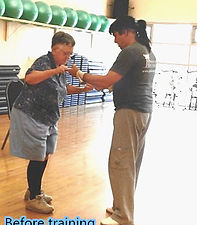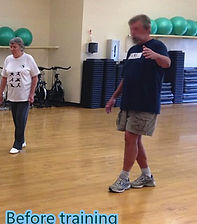





Balance & Parkinson Stroke Balance
We can not afford to have you fall

Balance, Balance ...

Accident prevention, Save life
If you do not have confidence with your leg strength, it is signal to tell you can’t wait, to improve your balance. In the USA, every year on an average 1.6 million older Americans were sent to the emergency room because of the fall.
A persons balance problem, can stem from different causes. The same training program can’t be used for all problems. Some individuals balance problem is due to a health issue. Incorrect posture, knee, hip, or spinal column and coordination issues could cause your balance problem. If you know you have a balance issue unrelated to a physical problem. Then practicing Tai Chi may be the best way to improve your balance.







Tai chi benefits for Stroke and Parkinson's disease
Tai Chi helps stroke patients recover
A recent study conducted by Professor Christina Hui-Chan, head of physical therapy at the University of Illinois at Chicago, showed that Tai Chi is very helpful in helping people recover from stroke.
People with stroke often suffer damage to various parts of the brain, which helps maintain balance. Not all, but some people have difficulty learning to walk again. Many people who suffer from these balance problems are more prone to falls and injuries.
The new study compared two groups of people who had suffered a stroke six months or more before the start of the study. The first group does Tai Chi regularly. The other group received exercise therapy. Participants in both groups took 12 hours of lessons per week and encouraged them to spend another 3 hours per week at home.
After one month training, the balance test performed by the Tai Chi group while standing showed better results. People in the Tai Chi group are able to transfer weight better, moving forward, backward, and left and right. In addition, they can better maintain their balance on moving surfaces with their eyes open or closed. The control group showed no improvement in any tests.
Stroke survivors face many lingering challenges. After a stroke, loss of balance can be very serious. It's not just that annoying and uncomfortable feelings affect the quality of life. More seriously, it will increase the risk of falling or being fatal.
However, Tai Chi can not only help maintain balance, it can also benefit stroke victims and other elderly people. It can also improve strength and cardiovascular health. In addition, participating in Tai Chi classes can provide healthy group interactions for many elderly people and help prevent social isolation in the social process.
The National Institutes of Health (NIH) also showed interest in the benefits of Tai Chi. Currently, the National Center for Complementary and Alternative Medicine of the National Institutes of Health is sponsoring research to learn more about the role of Tai Chi, how it works, and the diseases and conditions most helpful in combating it.
Of course, in terms of strength and coordination, exercise alone is beneficial. However, Tai Chi for stroke patients seems to be significantly better than exercise alone. This is especially true in terms of balance and coordination.
Tai Chi helps Parkinson’s patients recover
Parkinson’s disease is a common neurodegenerative disease in middle-aged and elderly people. It can cause limb tremor and reduce motor coordination. It can also be accompanied by non-motor symptoms such as sleep disorders, impaired autonomic nervous function, and cognitive decline. Patients cannot take care of themselves.
In China, the Tai Chi training program is used in the public welfare for the adjuvant treatment of Parkinson's disease jointly organized by the Fosun Foundation and Ruijin Hospital Affiliated to Shanghai Jiaotong University School of Medicine.
According to Professor Chen from the hospital, 90% of the "Payous" who participated in Tai Chi training have improved their condition, including memory, sleep, gait speed, lower limb strength, balance, and independence. Dependence is significantly reduced. The overall quality of life has been improved.
In addition, through functional magnetic resonance imaging and peripheral blood biomarker detection of patients, it is found that Tai Chi training can improve the brain function of patients, which confirms the auxiliary treatment effect of Tai Chi on Parkinson's disease.
Tai Chi's auxiliary treatment can be used as a rehabilitation exercise therapy for Parkinson's disease. Together with drug treatment, the combination of the two will bring better therapeutic effects. "Studies have shown that when a person walks in a straight line, the brain exercises the least. Turning and other movements require more use of the brain. Tai Chi's moves can be understood as using the brain to exercise. The half squat in Tai Chi, It is very effective in exercising leg strength and balance, which is in line with the rehabilitation needs of Parkinson's patients."
For example, Professor Chen said, "For example," Parkinson’s patient Zhou Lao recalled, "Two years ago, when 20 Parkinson’s patients in the same class started Tai Chi to assist in the treatment of Parkinson’s symptoms, some patients had tremors and unstable standing. People have stiff limbs, not to mention raising their hands flat as required, even simple standing has difficulty. After two years of Tai Chi, everyone has improved. I can stand until the doctor tells me to put it down. "While practicing Tai Chi, the patients also forged a deep friendship, encouraged each other, and became more cheerful.
In 2014, a study by the Key Laboratory of Behavioral Science of the Institute of Psychology of the Chinese Academy of Sciences found that in addition to improving body balance, preventing falls, reducing the risk of hypertension, and improving cardiovascular function, Tai Chi exercises can also change the brain. Functional activity.
Tai Chi can be integrated into the existing treatment of Parkinson's patients as part of the rehabilitation treatment. Of course, to achieve results, persistence is the only criterion.
Example of individual special balance training
We provide special training for people with balance problems due Stroke,Parkinsons Disease and Nerve system issue.
Please click below the video to see examples in 2014 and 2020 .
Parkinson's disease after 8-12 hours of training. In 2018
Strok issue paralysis one side four years --After 2 months teaining .
Balance improving every day--After 6 weeks classes.
Balance Problem Due to Nerve issue-- After 4 weeks training.
Regular balanced training test - before and after three weeks training.
Yes! We feel Amazin !


Come to join us today, back to your live. Yesterday you said tomorrow, Just start it, No time to wait.
Please cantuct our now to re-build up your confidence with healthy and light your life with happy & peace moods.
If you like to have individual balance training, or for some reason, you need the balance training at your home,
Danli Neilson: USA Certified
1.Tai Chi / Qi gong instructor level III.
2. Personal Fitness Trainer --Special for Balance.
3. Health Coach.
Email: taichi2danly@gmail.com
630-935-3531
